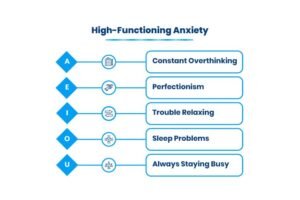A self-assured look can mask the high functioning anxiety and is therefore difficult to detect. Individuals who have such anxiety can appear successful, organized, and in control, yet internally, they are in a state of endless worry, stress, and overthinking. They challenge themselves to achieve high expectations, keep themselves busy so as not to think of the anxiousness aspect, and usually have perfectionist problems.
Similarly, minor mistakes can be overwhelming, and such physical manifestations as tension, headaches, or insomnia tend to occur. It is also important to understand the symptoms of high-functioning anxiety to be able to recognize them, even though it may not, in the short term, cause any significant impact on mental and physical health, it can do so in the long run. The awareness of such signs of high functioning anxiety is the initial step towards help-seeking and achieving balance in everyday life.
What Is High-Functioning Anxiety?
High functioning anxiety is when an individual experiences anxiety or stress but still carries on with their day-to-day life, such as work, school, or domestic chores. Likewise, they can appear to be calm externally, yet internally, they are never calm; they are hyperactive and have a quick mind.
Therefore, high-functioning anxiety also causes individuals to work too hard and be too busy to cover it. To illustrate, they may reason too much over every decision, cannot sleep, and are under constant stress to do more.
In addition, it is not a real medical diagnosis, but it is known to most medical practitioners in the mental health field. Anxiety that is not controlled in high-functioning individuals may cause fatigue, mood swings, or diseases. Thus, once you are used to worrying or getting stressed, mental health assistance will lower your anxiety and help you live without worries.
High Functioning Anxiety Symptoms
The following are the symptoms of high functioning anxiety:
- Perpetual rumination and obsessional thoughts.
- Perfectionism and fear of errors.
- Being constantly active so as not to get nervous.
- Problem with relaxing or sitting.
- Concerns about the future in times of good.
- Bodily stress, e.g., tensing of the muscles or headaches.
- Having the pressure to perform and attain high achievements.
What Causes High High-Strung Personality?
Here are the causes of high-strung personality issues:
- Intrinsic Delicate nervous system and genetics.
- Unrelaxing or stressful childhood setting.
- Work, school, or relationship chronic stress.
- Inadequate sleep patterns and insomnia.
- Working too long without interruptions.
- New life situation or constant uncertainty.
- Trauma/ previous emotional events.
- Daily life requires being in control.
- Absence of healthy coping skills to stress.
- No time to relax because of the busy lifestyle.
- Negative thinking and overthinking behaviors.
High Functioning Anxiety and Depression- What’s the Difference?
High functioning anxiety and depression are not equivalent, although the same feelings can overlap. To provide an example, the high-functioning anxious individual experiences worry, tension, and nervousness. However, they get time to catch up on work, school, or family-related duties. They can appear to be strong and triumphant before others and conceal their anxieties through being occupied, overthinking, and attempting to act flawlessly. It is mainly the fighting that they engage in that worries them, and the will to continue fighting due to the latter.
Furthermore, depression is not a similar condition because it is normally coupled with extreme sadness, loss of energy, and even a lack of interest in activities that the individual was fond of doing previously. Consequently, one should seek the services of a mental health professional so that life can be enjoyable.
7 Signs of High-Functioning Anxiety

1.Constant Overthinking
Individuals who have high functioning anxiety tend to repeat conversations and decisions in their mind, worrying about every single detail. They might even feel that they are never going to be able to relax, as their mind is running all over. This is a continuous noise in the mind that may cause one to lose track of the moment. In the long run, it may cause stress and exhaustion.
2.Perfectionism
They have extremely high expectations of themselves and are afraid of errors. They check and recheck everything; even minor mistakes are quite a big failure. This perfection may make them work harder than required. It usually makes them stressed and unhappy.
3.Trouble Relaxing
Even when there is silence, it is not possible to relax. Their mind continues planning, worrying, or thinking about what to do next. Remaining in one position may not sit well with them. Consequently, they keep themselves occupied to keep off anxiety.
4.Sleep Problems
Anxiety may lead to difficulty getting to sleep or staying asleep. The difficulty in resting is due to racing thoughts at night. The result of this insomnia is fatigue and irritability. In the long term, it impacts mood and health.
5.Always Staying Busy
They keep themselves busy with activities to forget that they are worried. They stay busy all the time so that they feel they are in control. Nevertheless, that may cause burnout and a lack of time to take care of oneself. It turns into a cycle that is difficult to break.
6.Physical Tension
Stress has an impact on the body through tight muscles, headaches, or stomach problems. These symptoms are usually not noticed till pain occurs. A stiff neck, jaw clenching, or aching back also come as a result of constant anxiety in many people. This tension may, over time, lead to fatigue, sleeping difficulties, as well as digestiveness issues.
7.Need for Approval
Individuals experiencing high-functioning anxiety tend to demand that other people reassure them. They can be afraid of being condemned or disappointing someone. This approval requirement may cause people-pleasing and an inability to say no. It also adds pressure to the process of ensuring that everyone is happy.
High Functioning Anxiety Test and Diagnosis
The high functioning anxiety test is a short list of questions that will verify the degree to which worry or stress influences your daily life. It inquiries about such issues as constant thinking, insomnia, or being nervous in cases when everything is alright. The online quizzes will provide a rough idea, but no concrete diagnosis.
Moreover, a mental health professional, such as a therapist, psychologist, or psychiatrist, makes the real diagnosis. They will discuss with you your feelings, daily routine, and health history as a means of eliminating other issues. Thus, high-functioning anxiety is not a medical disorder, and hence doctors normally seek general anxiety disorders instead. Such a check-up can lead you in the right direction of care, whether it is therapy, anxiety drugs, or even just simple changes to your lifestyle.
High Functioning Anxiety Treatment Options
Cognitive-Behavioral Therapy (CBT)
Having a conversation with a therapist, e.g., a psychologist or counselor, can be used to cope with high-functioning anxiety. Negative thought patterns are usually altered using cognitive-behavioral therapy (CBT). Therapy instills coping skills on how to deal with stress and avoid overthinking. It also aids in the identification of precipitating factors that aggravate anxiety. Frequent meetings can enhance well-being and day-to-day performance.
High Functioning Anxiety Medication
A psychiatrist can prescribe a medicine to aid in the management of symptoms of anxiety. Usually, anti-anxiety drugs or antidepressants are offered. These drugs can calm anxiety, enhance sleep, and alleviate physical tension. Therapy is usually used together with medication. Frequent follow-ups guarantee the safety and efficacy of the treatment.
Mindfulness and Relaxation
Mindfulness is the lesson of being aware and paying attention to thoughts without evaluation. The mind can be relaxed through the use of techniques such as meditation, yoga, or guided breathing. Exercises of relaxation help to soothe out the body tension and enhance sleep. They assist in the elimination of the overthinking and stress cycle.
Support Systems
Anxiety can be overcome with the help of supportive friends or family. Open discussion of emotions helps in eliminating isolation. Online communities or support groups provide support and tips. The feeling of being understood may reduce stress and give an impetus. Firm support systems are supportive of the therapy and other treatments to achieve improved results.
End Note
In conclusion, high functioning anxiety is a problem that needs to be treated as much as possible since, though it might not be obvious, it may influence mental and physical well-being in the long term. Lastly, unattended anxiety may result in sleeping disorders, burnout, tension, and relationship or work problems.
Symptoms can be managed with the help of early intervention with therapy, medication, lifestyle changes, and mindfulness. Mental Behavioral notes that professional help enhances coping mechanisms and eliminates future complications. Treating high functioning anxiety enables patients to stop worrying every day, reassert their control over their thoughts.
FAQs
What is high-functioning anxiety?
High-functioning anxiety is when an individual experiences always worrying, being stressed, or nervous, but can cope with everyday activities such as work, schoolwork, or family. They can appear successful and brave in front of others, concealing their fears.
What is the cause of the high-functioning anxiety in people?
It may grow with the help of genetics, a stressful childhood, personality, or continued strain in life. Some individuals are born with an insensitive nervous system, and thus, they are more inclined to worry.
What is the way to know whether I have high-functioning anxiety?
Some of the typical symptoms are overthinking, perfectionism, difficulty relaxing, sleep disorders, physical tension, and being constantly on the move to escape anxiety.
Why is treatment important?
The high-functioning anxiety, when not attended to, even in the latent form, can lead to burnout, health problems associated with stress, or emotional exhaustion. Therapy helps in the management of symptoms and improvement of daily life.
How to treat high functioning anxiety?
The treatment involves therapy, anxiety medicine, lifestyle change, including exercise and mindfulness, as well as the support of friends or family.








